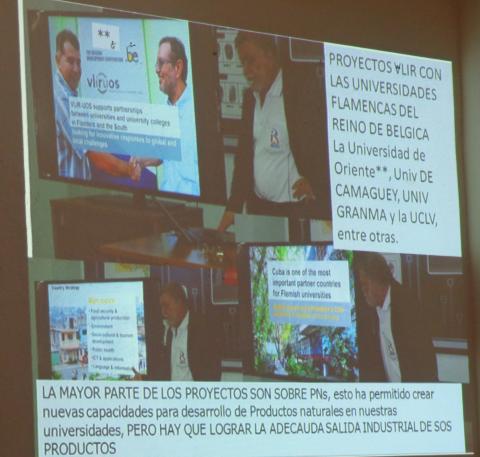
In the first National Exchange on Natural Products in Biomedicine, held on November 27th and 28th in Santiago de Cuba, the importance of the different VLIR programmes in the development of products of natural origin in Cuba was addressed.
The inaugural lecture was mainly referred to the long path of a natural product with therapeutic purposes, the main trends in terms of research, development, production and commercialization, among other topics. In that work session, Dr. René Delgado Hernández, President of the Cuban Society of Pharmacology, explained that, currently, some 125 products of natural origin integrate the Cuban Basic Table of Natural Products, "although the increasingly effective training of human resources and the strengthening of the infrastructure and the implementation of advanced pharmacological models are imposed".
Dr. René Delgado also addressed the impact of VLIR projects on the development of natural products in Cuba and the development of pharmacological sciences. "From the first projects with the Universidad Central de Las Villas, the University of Havana, as well as the Universidad de Oriente, Camagüey, Granma and others, this funding network has had an impact on the scientific development of our research centers. At present, we have new laboratories in the Faculty of Pharmacy of the UCLV, also in BioCubaFarma, in the UH, in the Institute of Pharmacy and Food and in the UO, all with state-of-the-art equipment that contributes to the research and training of our students".
Pro-Naturales Cuba is attended by academics and researchers from study centers, pharmaceutical laboratories and several universities in the country. The University of Camagüey shows a very rewarding experience along with a Team VLIR project coordinated by Dr. Paul Coss (Belgium) and Dr. Enrique Molina (Cuba). This project is focused on the installation of a center of excellence in the central-eastern region of Cuba for research and production of plant bioactives, explains Dr. Molina. "It is developed in collaboration with several institutions in this region of the country, including the Center for Industrial Biotechnology Studies, the Bioplant Center of the University of Ciego de Ávila, the Center for Immunology and Biological Products of the University of Medical Sciences and the Genetic Engineering and Biotechnology Center and the University of Camagüey itself. In general, we work on creating a platform to develop advanced products and technologies from Cuban endemic plants".
According to Dr. Molina, until present times, the University of Camagüey has entered 3 Team Vlir projects and 4 South-South initiative ones, which have to do with the study of the shrimp larvae to increase its production in the country, also with the management of the Marabú plant and the recovery of land, among other topics. Dr. Molina is grateful for the collaboration with Universidad de Oriente, an institution that he affirms “is establishing itself as a leader in the creation of an inter-university platform for scientific collaboration".
In two work sessions, the experts discussed the experiences of Cuban universities in the research and development of natural products, as well as the productive capacities for the development of these and everything related to their commercialization in Cuba. As a result of the VLIR-IUC Oriente programme, the advanced in terms of equipment for the development of natural products such as edible mushrooms was shown and Dr. Yilán Fung and Dr. Albis Ferrer presented the experience of the use of magnetically treated water in species such as Romero and tomato.
"The significance of the magnetic field, -says Dr. Fung - is that the incidence of static magnetic fields is a stimulation that is received by water. When plants are irrigated, this is recorded as a physical stress that allows the increase of secondary metabolites and therefore a better quality plant and higher productivity is obtained”.
Specifically, Romero is a model plant as a natural antioxidant and in Cuba there is little cultivation of this plant. Dr. Yilan points out that it is the province interest to incorporate this plant among its crop priorities. In the second stage of the VLIR programme, work will be carried out to study the mechanisms of action of the magnetically treated water in these and other crops at the molecular level.
It is estimated that this first national meeting will open the doors to the necessary and already indispensable collaboration between research centers and Cuban industry.
Translator: Maité Elisa Palacios Herrera.
Dr. René Delgado, President of the Cuban Society of Pharmacology, affirms that VLIR projects have been of vital importance in the development of natural products in Cuba and the development of pharmacological sciences.
Graduated from the doctoral training programme VLIR-IUC Oriente, PhD Albis Ferrer and PhD Yilán Fung advocate in favor of continuing studies on the uses in agriculture of magnetically treated water, in order to raise the quality and productivity of medicinal plants, vegetables and others.
Members of the P3, aimed at the development of biopharmaceutical products from natural sources (UO) and Team VLIR Camaguey whose perspective is the research and production of plant bioactives. Photos: Daylenis Blanco

